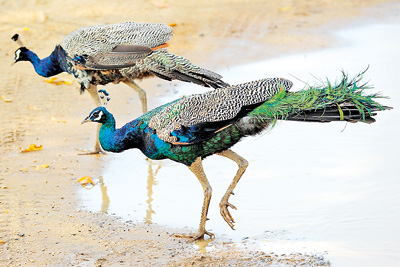News
A zoo we don’t want in our backyards
Peacocks, monkeys, wild boar and porcupines are descending on urban areas and farmland, emboldened by a lack of predators and tempted by edible garbage.

While peacocks used to be found only in the dry zone area of the south, in recent years peacock numbers had increased and the birds had encroached into Galle (file pic)
The new pests are causing huge damage to crops and homes, leading to an outpouring of complaints, but there is a reluctance to crack down on the pests.
Farmers in the districts of Polonnaruwa, Matara, Hambantota, Ratnapura and Monaragala districts say 40 per cent of their crops are being damaged by monkeys, peacocks and wild boar.
Porcupines are uprooting the villagers’ yams, they say, and monkeys have become nuisance, damaging furniture and houses as they steal food from homes.
Monkeys can be found in gardens in most urban areas such as Kandy and Colombo outskirts, devouring fruits and foliage and causing expensive damage to roofs.
Kandy District Secretary Tissa Karunaratne said up to 40 per cent of crops have been eaten or destroyed by increasing numbers of toque macaque monkeys and porcupines in his area.
Both species have spread throughout the 20 divisions of the district due to the lack of natural predators such as jackals, fishing cats and pythons in nearby forests.
“We continue to issue five to six new rifles and shotguns to farmers every year and renew around 877 gun licences but the farmers refrain from culling animals due to their religious beliefs – particularly, they are unwilling to kill animals in the district where the sacred tooth of the Buddha rests,” he said.
Mr. Karunaratne said the Provincial Council wanted to conduct mass sterilisation of macaque monkeys but this had not yet occurred. He said some non-governmental organisations had carried out small-scale sterilisation programmes.
The Sunday Times learned that complaints about porcupines digging up farmland and monkeys eating crops come up incessantly at agriculture coordinating committee meetings and in meetings held with the Department of Wildlife Conservation (DWC) but the matters remain unresolved as the meetings conclude without solutions.
Polonnaruwa District Secretary S.P. Abeywardhana said the only viable solution to deter the monkeys, wild boar and porcupines was to re-introduce their natural enemies.
“I am suggesting the government and the Department of Wildlife Conservation to breed wild cats and jackals in captivity and re-introduce them to forestry areas,” he said.
He said despite raising the suggestion many times to the wildlife department and other government officials, nobody had acted on it.
Mr. Abeywardhana pointed out that monkey numbers in the past were controlled by natural predators such as rusty spotted cats, jackals and big snakes but due to habitat loss and the use of pesticides on farms predator populations had declined.
He said if the wildlife ecosystem could be restored, animal numbers could be balanced.
He is of the view that sterilising or relocating monkeys are not viable options. Restoring the natural process would solve problems without incurring massive expenditure, Mr. Abeywardhana said.
He said both langur and toque macaque monkeys were increasing in great numbers around farms in the Polonnaruwa food belt, posing a larger threat to crops than elephants, wild boar and porcupines.
Peacocks and monkeys are thriving outside parks due to local belief that peacocks are divine as the bird is symbolised as the vehicle of the god of Kataragama while monkeys represent the Hindu god, Hanuman, Mr. Abeywardhana said, adding that Buddhist culture turned people away from the notion of culling animals.
In Galle, too, District Secretary Somaratne Vidhanapathirana said, peacocks, macaque monkeys and wild boar were damaging farmland.
He explained that while peacocks used to be found in the dry zone area of the south, between Hambantota and Kataragama, and not in the wet zone, in recent years peacock numbers had increased and the birds had encroached into Galle.
“Peacocks and wild boar eat the crops while monkeys attack the banana plantations,” he said.
“We have issued airguns to protect the crops from pests such as wild boar,” Mr. Vidhanapathirana said. Although there is no restriction on killing wild boar in farmland, selling or transporting the meet of the animal is illegal.
Mr. Vidhanapathirana also said people avoid killing or hurting peafowl as they believe the birds are associated with the god of Kataragama.
The wildlife department’s Director-General, Chandana Sooriyabandara said his officials are currently out of options to mitigate the problem.
He pointed out that breeding predatory animals in captivity and re-introducing them to forests was a long-term project as habitats need to be developed, and wild cat breeding programmes could take decades.
Mr. Sooriyabandara also explained that re-introducing animals would cause territorial problems for members of the same species currently in the wild.
Mr. Sooriyabandara said society in Sri Lanka did not approve of culling animals to maintain balance; in other countries, species management was one of the most important activities carried out by wildlife authorities.
He suggested the general public and city planners could prevent animals coming into city limits by managing waste and designing cities so that animals would not easily find food, water and favourable habitat.
He said predator numbers had decreased because forestry and marshy areas were fragmented.


